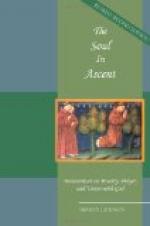Moreover the inequalities of the human condition are strangely prophetic. Much has been made of this argument in the past,—Job and Socrates both felt its force.
The value of it has often been discredited, but without reason. How shall the bitter injustice which is frequently found on the earth be explained? Some have an abundance of wealth, some have literally nothing. Some enjoy the best of health and strength all their days, while others pass their years in suffering and trial. Some are surrounded by families and fairly revel in love and friendship, and others lead lonely lives toward a welcome end. Some are strong and brave, and able to act a part in the drama of life; others are weak, obscure, unknown, and, for aught that they or we can see, might as well have never been. The law of heredity sweeps down from the past and brings a terrible legacy to many who spend all their days in trying to escape from what has been forced upon them. What shall we say concerning those who are born in lust and must live in the midst of the vice of a great city, and who, in turn, give birth to a lustful and vicious brood? Have they had a fair chance? Will their children have? Such questions have puzzled the most earnest thinkers of all time, and there has seemed to be but one explanation. Job seemed to be in darkness, until at last there flashed upon his mind this question, which is also a modified affirmation, “If a man die shall he live again?” If he live again, then it is possible that what seems to be unjust may be righted; and those who have known only suffering and pain during their dwelling in the flesh, may some time enter into the fruition of their discipline in the joy and victory of the endless life. The more this argument is pondered the stronger its force becomes. It carries conviction to all who are deeply sensitive to the common human experience, and who at all understand the misery and the suffering of human existence. One in the fullness of his physical strength may think little about it, but that deformed girl who asked her mother after service one Easter Day, “Mother, is it true that in heaven I shall be as straight as




